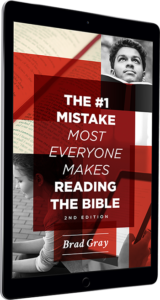Episode 035 – Psalm 23 Pt 2: Green Pastures
Key Passage(s): Psalm 23:2; Philippians 4:10-13
A flock thrives in the desert, so what could David possibly be talking about when he mentions “Green Pastures” in Psalm 23? The answer will likely shock you. I always thought it was a statement about God abundantly giving us what we need or want. And then I went to Israel, and everything changed. This teaching is geared towards doing the same for you.
Discussion Questions
- What’s your biggest takeaway from the teaching?
- How have you traditionally understood the “green pastures?”
- Were you surprised by the context of Philippians 4:13? How have you traditionally understood that passage?
- Where do you find yourself today? In the green? In the brown? In a combination of the two? What’s the biggest challenge you’re facing in your current reality?
- Where do you need strength and courage to live out contentment in your life right now?
- How has your understanding of God and how He provides for us changed as a result of what you learned in this teaching?
- How will you begin walking out your learnings this week?
For Further Study
- The Good Shepherd: A Thousand-Year Journey from Psalm 23 to the New Testament by Kenneth E. Bailey
- Psalm 23: A Photo Commentary by Steven D. Anderson and Todd Bolen
- Psalm 23: Photo Companion to the Bible (pictures) by Todd Bolen (BiblePlaces.com)
- While Shepherds Watch Their Flocks by Timothy Laniak
- Becoming a Judean Shepherd by Doug Greenwold
As an Amazon Associate, we earn from qualifying purchases (at no extra charge to you).





Thanks for this teaching. You’ve given me lots to meditate on this week..to contemplate my attitude & heart for my Shepherd in the rich & full seasons of material/spiritual abundance along with lean times. I thought of God’s instruction to the people of Israel when their land is rich in abundance. The sign of thankfulness is to leave the corners of their field uncut so any who are struggling with less-than while your experiencing abundance can be blessed by your plenty. Makes me think of how the two can fit together.
That is a great connection, Denise. Thank you for sharing that.
Brad-As one may be walking in wilderness/brown pastures it surely is important for one to remember the “green”, that is to remember all of the areas in which He has so faithfully provided and carried us through. When we are in the green pastures, we need to eat and drink deeply in full gratitude to the Shepherd giving Him absolute credit for leading us and settling us down in this green place. As we are there, it is well to remember that the lean time of the “brown” season can come today and in it we still need to be walking step by step with the Shepherd. Another observation is that we often give ourselves great credit for being in the green when in truth, it is the shepherd who deserves all the praise for bringing us there.
Absolutely, Harry. Such great comments here. Thank you for offering them.
Name it and claim it is false teaching then!
Assuming that God never has lived in “flesh” but is as Jesus (Emanuel God with us) is and thus is TORAH in flesh-John 1-WORD then Paul is quoting Psalm 23 ? to those of Jewish background.
WOW!
Once heard a Rabbi call the two handles of TORAH scrolls -Rod and Staff, then David is stating that the TORAH comforts me. If we are not under the 613, minus the blood ones, laws then how in the world can David say that? Heh heh!
Thanks for a slice of reality and truth in the 23 rd Psalm-Brad Great piece
Appreciate it, Bill. Thanks.
Brad,
I’m enjoying this series and learning so much. You are truly anointed.
I bless God for that, Tru.
You provide a pedagogically powerful contrast in Part 2 when you juxtapose the photos of green and brown pastures … while talking about Paul’s secret for thriving in both! Thank you for such a clear visual explanation. I’ll never look at Philippians 4 the same.
Really appreciate that, Doug. Thank you.
Part 2 challenged my fledgling skills for interpreting the Biblical text like you do: in its original context.
Here’s the question I’ve been grappling with:
Given the Negev desert’s 11th-century context, what skills did a shepherd of that time use to help sheep lie down? (What were his specific actions, strategies, techniques?)
I scoured the resources listed in the ebook, to no avail.
Maybe I missed something in those resources. Or is there another level of resources available?
Curiously,
As long as the sheep have enough food (full fed), enough water, and don’t feel threatened, they’ll lie down. The shepherd needs to prove trustworthy and provide for the sheep’s basic needs. If those are met, all is well for the sheep. And a shepherd doesn’t make the sheep lie down. If they’re satiated and content, they lie down on their own. Hence, I like the translation, “He settles me down …”
Thanks for helping me learn the interpretive ropes, Brad! Appreciatively …
Hey Brad,
Cheryl and I are enjoying your series on psalm 23. We’ll done! Your words on contentment are right on target.
Blessings, Roger & Cheryl
I really appreciate that, Roger & Cheryl! So great to hear from you 🙂
I think I’m missing something. I understand what Paul is saying in Philippians 4 about contentment with a little or a lot but I’m missing how it correlates to David in Psalm 23. David references green pastures but doesn’t contrast them with sun-baked land that lacks fresh grass.
Hi Lorenzo. Thank you for asking for clarification. “Green pastures” in Psalm 23 doesn’t always mean lush pastures of plenty. For a few months out of the year, the “green pastures” are indeed green, lush, and abundant. But for the rest of the year, the grass on the hillside for the sheep and goats is sparse (often more of a tan color than green), and they have to keep moving to get enough food. For Paul, there were times where he had everything he needed, and in abundance. But there were many times where he didn’t have a lot, but God gave him just enough to keep going. Contentment for Paul is being content whether you have plenty or you don’t have much at all. I trust that clarification helps.